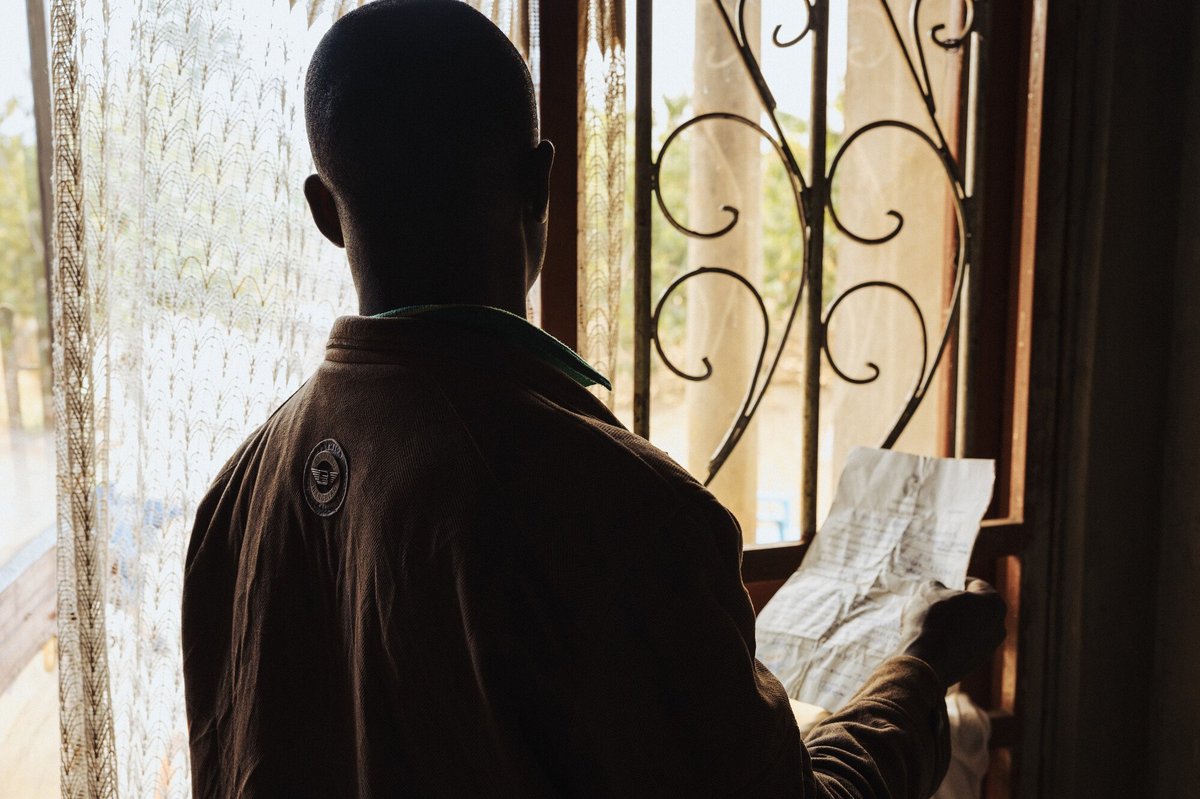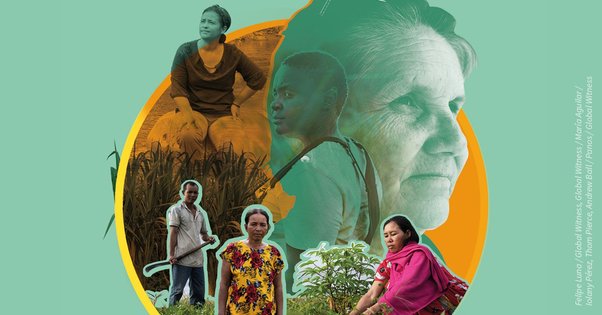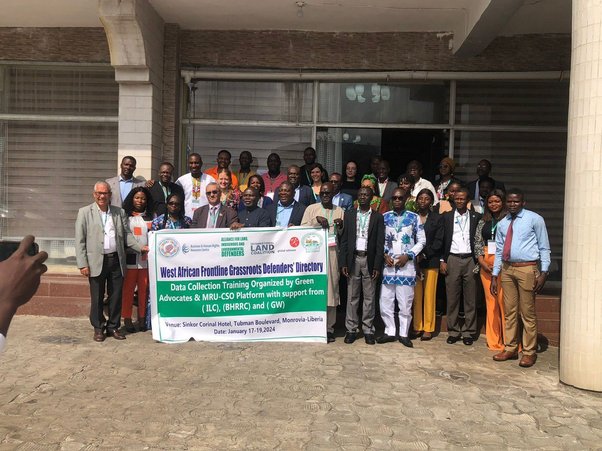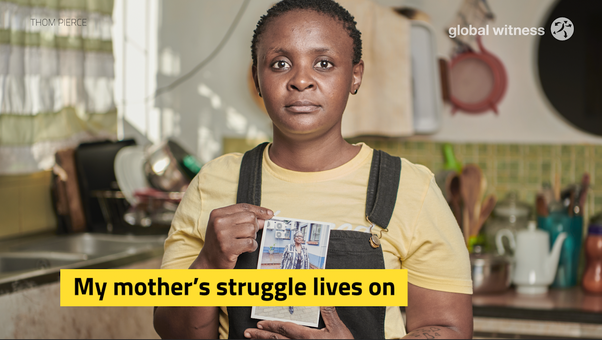Introduction
When TotalEnergies first visited Swalehe Nkungu’s remote Tanzanian village in 2018, he and his neighbours were promised favourable compensation in exchange for their land. Five years later, Swalehe said he was strong-armed into signing a contract he wasn’t permitted to read, and which awarded him inadequate compensation. It wasn’t enough to buy replacement land, he said, and his family with 12 children spent the money on food and survival. “Now we have nothing,” he said.
His efforts to seek help from Tanzanian civil society groups has been met with intimidation and harassment from authorities. Three times in the past year, the 48-year-old farmer has been interrogated by government officials about his civil society connections.
The morning after he came home from a civil society workshop in February 2023, he was summoned to the office of a local government official. Kept alone in a room, Swalehe was interrogated about his travels and opposition to the planned oil project by the official and an intelligence officer for the next three hours. They warned him to stop and threatened to revoke his passport, he told Global Witness.
Swalehe is among several dozen people facing reprisals for taking a stand against French oil giant TotalEnergies’s plans to build the world’s longest heated crude oil pipeline in East Africa.
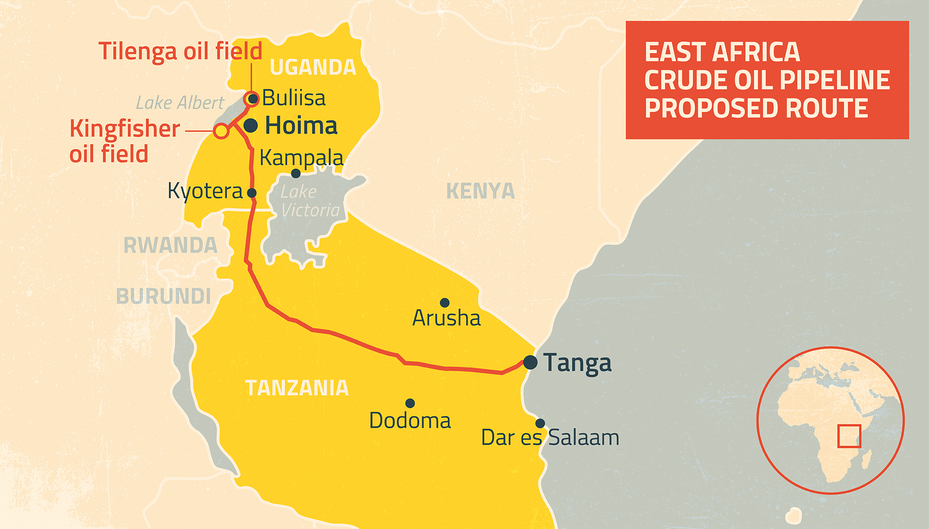
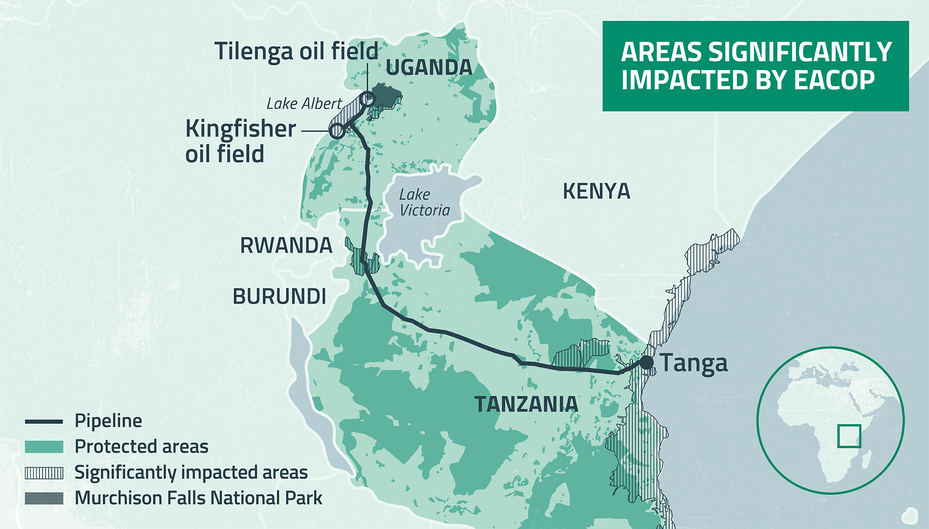
The US$5 billion East Africa Crude Oil Pipeline (EACOP) will slice through 1,443km of land from western Uganda to the eastern coast of Tanzania, where it will be exported to international buyers. The Tilenga oil field, which drills in a national park, will feed oil to the pipeline. Together the projects traverse wildlife habitats, protected areas and Indigenous lands, and will affect over 100,000 people. It is estimated the project will emit 379 million tonnes of CO2 over its 25-year life span – more than the UK’s national emissions in 2022. Construction on the pipeline started in 2023, after multiple delays.
The pipeline and the Tilenga oil field is backed by TotalEnergies, which has partnered with two state-owned oil companies: Ugandan National Oil Company (UNOC) and Tanzania Petroleum Development Corporation (TPDC), alongside China National Overseas Oil Corporation (CNOOC).
Global Witness teamed up with Tasha Research Institute in Uganda and Green Conservers in Tanzania to investigate corporate complicity in attacks on defenders challenging the pipeline’s construction.
Our investigation is based on interviews with over 200 people affected by the pipeline, activists, journalists and experts, as well as analysis of media and public reports by NGOs, civil society organisations and courts.
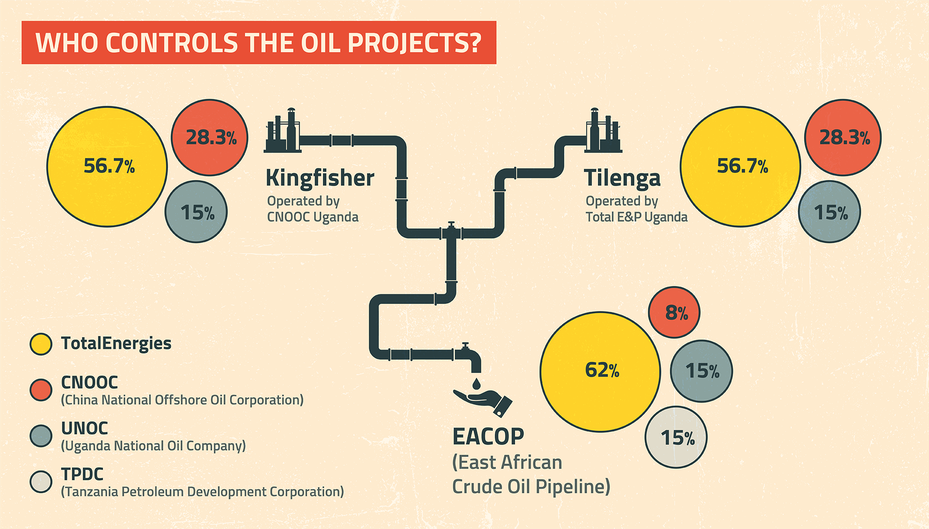
The pipeline and the Tilenga oil field is backed by TotalEnergies.
Our findings suggest that a climate of fear in both Uganda and Tanzania is stopping civil society and communities from challenging the pipeline. TotalEnergies‘ representatives, contractors and business partners have reportedly pressurised people into accepting inadequate compensation rates for their land. While agents of the state have pursued a campaign of intimidation and criminalisation against climate activists and civil society organisations that stand up for displaced families.
Stronger global action is needed to protect environmental and human rights defenders as part of the ongoing climate negotiations at COP28 in Dubai.
Responding through lawyers, TotalEnergies strenuously denied any suggestion that it has skirted its responsibilities on business and human rights, bullied community members into accepting unfair settlements, done anything to create a climate of fear in affected communities, or prioritised its own financial interests above communities and the environment.
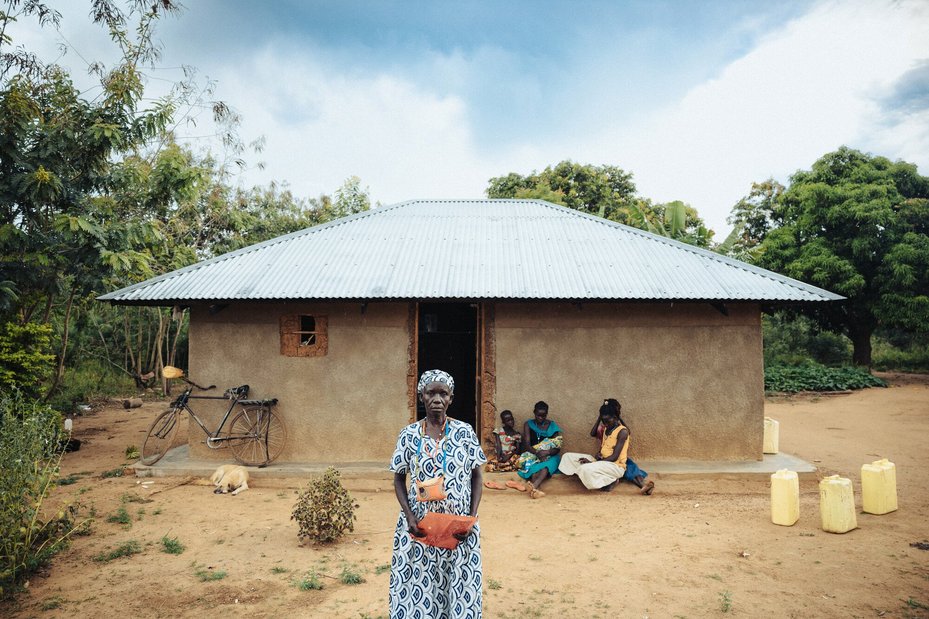
Leoniah Itho Okella said she was pressured into accepting compensation that was too low
Climate of fear
Reported intimidation, delays and low compensation
Many community members we interviewed in Tanzania and Uganda say they were short-changed during the land-acquisition process. The compensation process was heavily delayed, in part due to the COVID-19 pandemic, while cut-off dates were imposed that prevented people from freely using their land and growing more profitable perennial crops. TotalEnergies reported that, in many cases, uplifted compensation has been paid out because of delays.
People waited years for their compensation, and by that time they said land prices near the pipeline route had shot up – fuelled by land speculation – and priced them out. Many said that meant they could not afford to buy new land with the compensation offered. Communities also said they were excluded from the decision-making and valuation process, resulting in crops and properties being undervalued.
In Tanzania, where the law provides that the president owns all land, and people only have customary usage rights, it can be more difficult to reject land acquisitions. Many people said they have become poorer and are now struggling to survive because of the project.
The project steamed ahead despite public claims of a coercive land-acquisition process, accompanied by delays, poor communication and inadequate compensation for families.
TotalEnergies, its contractors and business partners, have been accused by local and international campaign groups of pressuring, bullying and intimidating communities into accepting bad deals.
As we detail in this report, Global Witness has found that there is evidence to support these accusations.
Eyewitnesses say company employees sometimes travelled in large convoys, at times accompanied by police, army and private security forces, which intimidated communities even more.
“We lived in fear and ended up accepting the little money they chose to give us,” one community member from Kikuube, Uganda, said, summarising how the community felt about the situation.
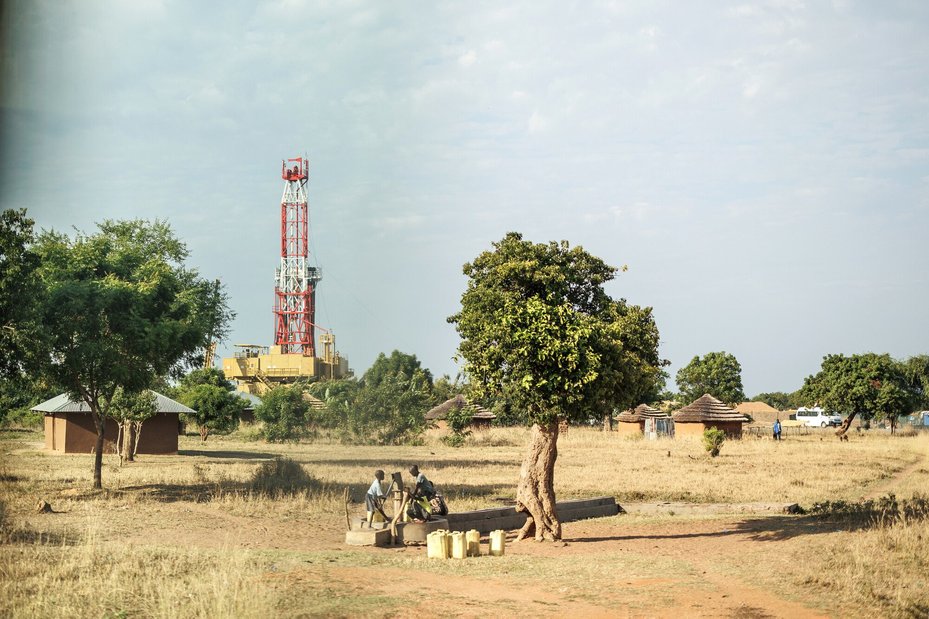
Communities in Buliisa, Uganda, have seen oil rigs pop up near their backyards (Jjumba Martin / Global Witness)
TotalEnergies, however, has denied carrying out “any part of the land acquisition process in the presence of the police, the army, or privately retained security forces.”
There were also alleged issues with the contracts, with a failure to provide communities with enough time to understand documents or with ensuring these were issued in appropriate languages. In Uganda, contracts were only in English, while in Tanzania, some community members say they were forced to sign contracts on the spot, without even reading them.
“People signed under duress, they felt they had no choice,” said Benon Tusingwire, head of the Hoima-based group Navigators of Development Association (NAVODA).
Around one in five people in both Uganda and Tanzania are illiterate, most of them in rural areas. Yet Global Witness interviewees said only company-appointed lawyers and translators were offered, who appeared to have sided with the government, adding more pressure on communities. A Tanzanian farmer recalled querying the lawyer about the low compensation rates, only to be told: “If you have any issues, you can take the government to court.”
Community members say they were told by company and government officials – sometimes accompanied by armed security forces – that they had no choice but to accept lowball compensation rates, that the project would move forward anyway, and that they were powerless to protect their rights and speak out against the government. Those who refused say they were threatened with court action, and faced increased pressure from companies and government officials. Their only recourse, they were told, was to take legal action, which they would lose and would be costly.
“Often they get told, there’s nothing you can do, if you resist you will be evicted anyway.”
The EACOP Team in Kampala denied to Global Witness that any intimidation or harassment has taken place and insisted that communities are compensated fairly. In a letter to Global Witness, TotalEnergies insisted that both EACOP Ltd and its subsidiary TotalEnergies E&P Uganda (TEPU) adhered to standards set out by the International Finance Corporation and that compensation was made at “full replacement cost" or people were offered new-build resettlement houses. On the specific methodology of compensation, Total said it has used:
“…market evidence such as recent land sales agreements and land transfers [that] are collected from the project area to provide data on the value. In addition, TEPU and EACOP Ltd gathered information from local government representatives, Area Land Committee members, and other local residents who had knowledge of local land and asset values. This information was analysed to reach an appropriate rate per unit area. The market research exercise targeted the different landowners and types of land tenure within the specific villages in the project area. Local communities and stakeholders were actively involved during the valuation process, which is well documented, and affected parties were engaged with on an individual basis before the values were determined. Under these circumstances ... compensation payments could not be – and, in fact, were not – uniform.”
Community members were provided with 'third-party’ lawyers and translation services in accordance with the law, TotalEnergies said. “PAPs [project-affected persons] who face challenges in finding equivalent replacement land have been those who have chosen to opt for land that is outside of the designated project area where land prices are higher,” read the letter. Once sellers voluntarily agree with the contents of the compensation agreement, arrangements are made to sign and formalise it. It is then signed in the presence of a chairperson, a signatory’s spouse (where applicable), a Resettlement Planning Committee (RPC) or EACOP representative, the signatory’s chosen witness, a translator, and a lawyer, Global Witness was told. Sign-up to the compensation schemes runs at approximately 95%, with “no compulsion” to sign anything, it is claimed.
TotalEnergies' lawyers added that the oil company was not responsible for any actions carried out by government or state officials, and that the pipeline land acquisition and compensation system included grievance investigation processes. TotalEnergies has made "clear and longstanding commitments to respecting human rights and the environment", they said. It was pointed out to Global Witness that livelihood restoration programmes operate in affected communities "for three years... or until livelihoods are fully restored" and target "financial literacy, an agricultural program[me] for the improvement of crops and livestock, nurseries, beekeeping, financial management and business skills, and vocational training to support jobseekers."
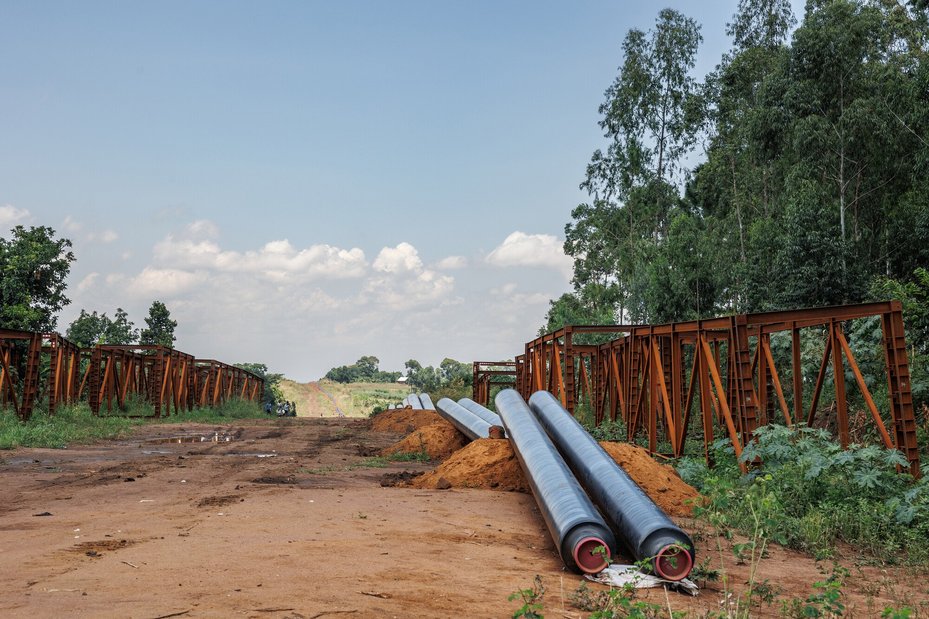
Work on the pipeline in Hoima, Uganda. The 1,443km pipeline will cut through wildlife habitats, protected areas and Indigenous lands. (Jjumba Martin/ Global Witness)
Uganda’s oil: a dictator’s pet project
Since oil was discovered in Uganda’s Albertine Rift in 2006, its exploitation has come to signify President Yoweri Museveni’s ambitions. Museveni, who’s been in power for over 37 years, has described it as “his oil” and built the country’s development strategy on its back. He has poured hundreds of millions of dollars into developing infrastructure for the pipeline, including building a network of roads, leaving the country heavily indebted.
The Ugandan government has drawn criticism for failing to publish its contract with TotalEnergies, amid concerns about corruption. According to an official report, published in 2022, around a quarter of the country’s national budget is lost annually to corruption.
Museveni’s family is reportedly linked to companies involved in the oil project, including the private security firm that is retained by TotalEnergies, Saracen. This gives the president additional interest in crushing opposition to the project. Speaking at the final investment decision last year, with TotalEnergies CEO Patrick Pouyanné in the audience, Museveni blasted NGOs as “useless people” who should be left to “sleep in the bush”.
State operators – including the Petroleum Authority of Uganda (PAU), local government authorities, and security forces such as the nebulous oil and gas police – are implicated in reported abuses against communities.
Company staff and contractors allegedly implicated in intimidation
Many sources accused TotalEnergies and companies it contracted to manage the land-acquisition process in Uganda, Atacama and NewPlan, of pressure and intimidation. Witnesses say they have muscled in on civil society meetings, snooped around for information on community volunteers, and warned land and environmental defenders against ‘leading people astray’ or spreading ’false information’.
Three witnesses described an incident in April 2021 when an armed official barged in on a community meeting in Rakai District, together with a staff member of TotalEnergies. Neither of them had been invited. The armed man, who claimed to be from the Ministry of Energy, berated those holding the meeting and accused them of misleading communities. “You are telling them to resist the project,” Florence Nakandi from the Community Transformation Foundation Network (COTFONE) recalled being told. “If you don’t stop what you’re doing, we will see who is who.” They stopped the meeting, fearing for their safety.
Defenders holding out for a better deal testify to an uptick in intimidation.
In one case, a TotalEnergies contractor appears to have intimidated a farmer locked in a dispute with the company by building a fence around his house. Fred Balikenda has refused to move, despite what he said was escalating pressure. In response, Total’s contractor began building a fence that isolated him from his neighbours and even his toilet. He said it feels like living in “a prison” and that he has also been threatened by government officials working with Total on the project. TotalEnergies denied intimidating Mr Balikenda and insisted that the fence was erected with his consent and for his “safety”.
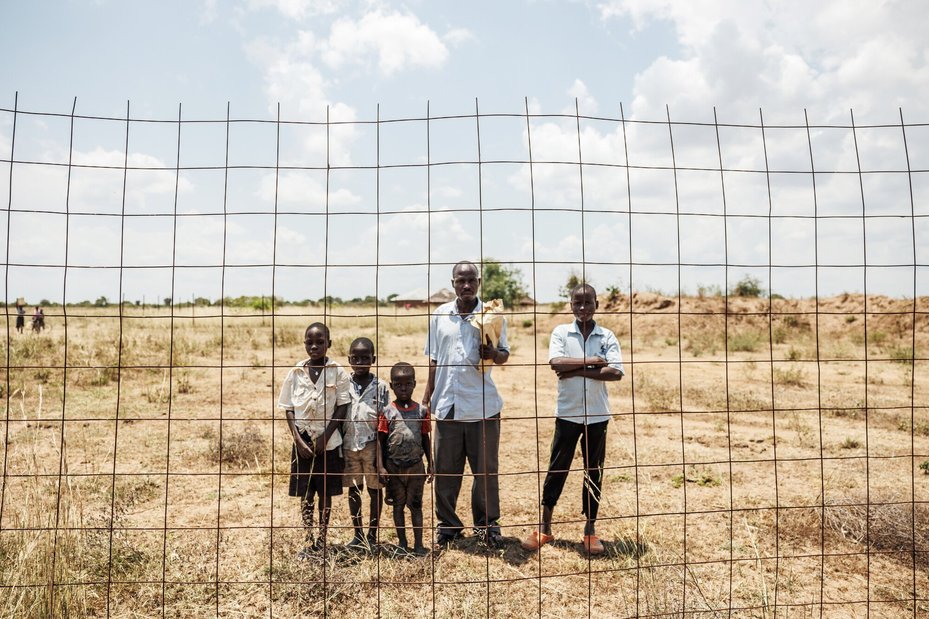
Fred Balikenda has been fenced in by a TotalEnergies contractor (Jjumba Martin / Global Witness). Jjumba Martin / Global Witness / Jjumba Martin / Global Witness
On a couple occasions, TotalEnergies contractors are said to have been present, or even involved, when Ugandan officials turned up to threaten defenders with arrest. Nelson Tibemanya, a farmer and a community activist who has fought for better compensation, said government representatives threatened him many times.
He said NewPlan was present at his home in 2022 when an official from the PAU threatened to arrest him for “sabotaging” government programmes if he refused to accept the compensation. “If you don’t sign, you’ll go to court…you’ll be arrested for obstructing the project,” he recalled. Nelson has since accepted the compensation.
“I was affected psychologically, I couldn’t sleep sometimes in the house,” he said. “I was scared of getting arrested – it was psychological torture.”
In another case, a TotalEnergies contractor reportedly issued the threat. Fred Mwesigwa, an outspoken land defender in Buliisa, said a community liaison officer at Atacama threatened him with arrest for “sabotaging government programmes” in July 2020 if he didn’t accept his compensation offer. A witness at the scene confirmed the incident to Global Witness.
“I was affected psychologically. I couldn’t sleep sometimes in the house … I was scared of getting arrested – it was psychological torture.”
Around a dozen community members reported being threatened with court action by companies involved in the project. In Buliisa, the location of the TotalEnergies-controlled Tilenga oil drilling project and processing facility, the government has used compulsory purchase orders to seize land from resisting communities.
"This is a public interest project by the government of Uganda, which has decided to exploit its sovereign resources. Total and EACOP do not own the resources,” an EACOP team representative told us at a meeting in Kampala. “Some people may not be happy about being displaced as with any such acquisition. If Total and EACOP didn’t come in, [the project] would have been licensed to someone else. The standards [the company has] acquired [land] under are far higher than if done by a Ugandan company.”
Through its lawyers, TotalEnergies “strenuously” denied that TEPU and EACOP Ltd have intimidated any affected people into signing any compensation agreements. “On the contrary,” read its letter to Global Witness, “TEPU and EACOP Ltd have put in place numerous supports to ensure that PAPs only sign these agreements under their own free will and treat this concern with the upmost seriousness. Threats or intimidation are not tolerated and over 90% of grievances submitted to TEPU and EACOP's dispute resolution procedure had been resolved as of August 2023.
“EACOP Ltd and TEPU do not tolerate any threats or intimidation of PAPs and would investigate any such allegations raised with them. Any allegations of intimidation received will automatically trigger an internal investigation.”
The lawyers added that such allegations had been tested in court when civil society groups sued TotalEnergies under the French Duty of Vigilance law in a case dismissed in 2023. “The NGO’s [sic] claim was found to be inadmissible and the Court held that Total had formally established a ‘Vigilance Plan’ as required by French law that included sufficiently detailed measures which prima facie complied with this law. Thus, the Court found that no manifest unlawfulness had occurred.”
In fact, the Court dismissed the case on technical procedural grounds and did not go on to rule on whether there was ‘on the ground’ implementation compliance with the Vigilance Plan insofar as it included safeguards for human rights and environmental standards.
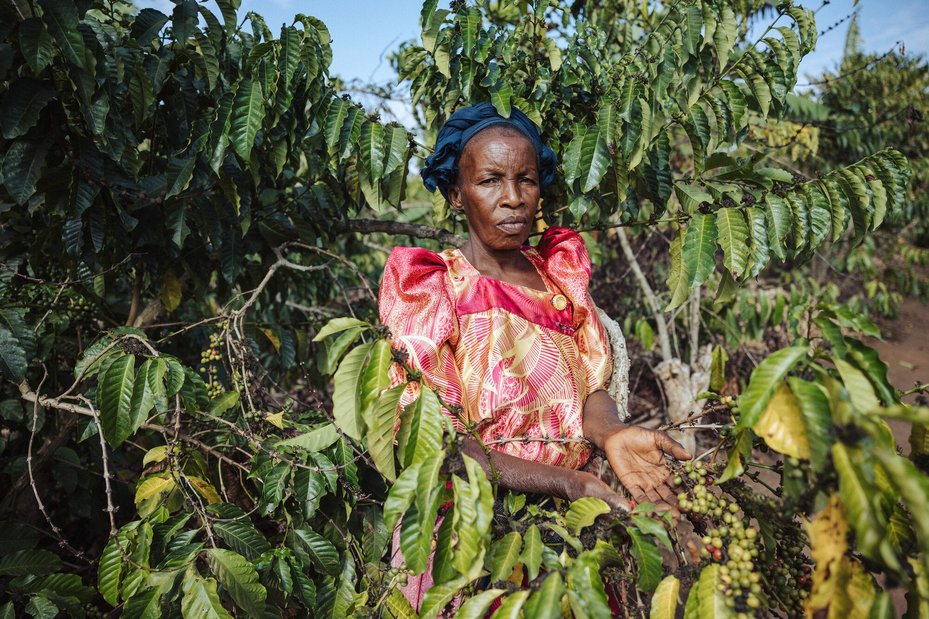
Mariam Najjagwe is a community volunteer who said she’s been accused of spreading misinformation by a TotalEnergies contractor
Activism under siege in Uganda
The Ugandan state has pursued an aggressive campaign of criminalisation, harassment and intimidation of defenders who have mobilised communities in opposition to the project. This appears to be a systematic and deliberate tactic to undermine opposition to fossil fuel development. At least 47 defenders challenging oil development or EACOP have been detained or arrested in Uganda by the state since September 2020, some more than once, according to an open-source analysis conducted by Global Witness. Many have been accused of public order offences, such as public nuisance, instigation of violence, and unlawful assembly, and have often been held for hours or days before being released.
But these numbers barely scratch the surface of the attacks on defenders mobilising around the oil project. Civil society groups supporting communities in the oil region have been shut down by police, run out of town, or harassed by the authorities or the ‘oil and gas police’, an opaque security body tasked with protecting Uganda’s oil interests. TotalEnergies is reportedly developing a security agreement with the oil and gas police, although it does not presently appear to be in place. It is not suggested that TotalEnergies or its contractors on the pipeline are responsible for the activities of state officials.
The oil town Buliisa is among the most dangerous places in Uganda to be a land and environmental defender. Joss Mugisa, a frail 66-year-old and the founder of the Buliisa-based Oil & Gas Human Rights Association, found this out firsthand. In October 2021, his organisation’s office was raided by over a dozen armed men, including government officials and the oil and gas police. They took files, certificates of registration and documents before removing the organisation’s signs from outside and telling them they were shut down.
Shortly afterwards, Mugisa was arrested on trumped-up charges of vandalism. “They know without me the organisation would die,” he said.
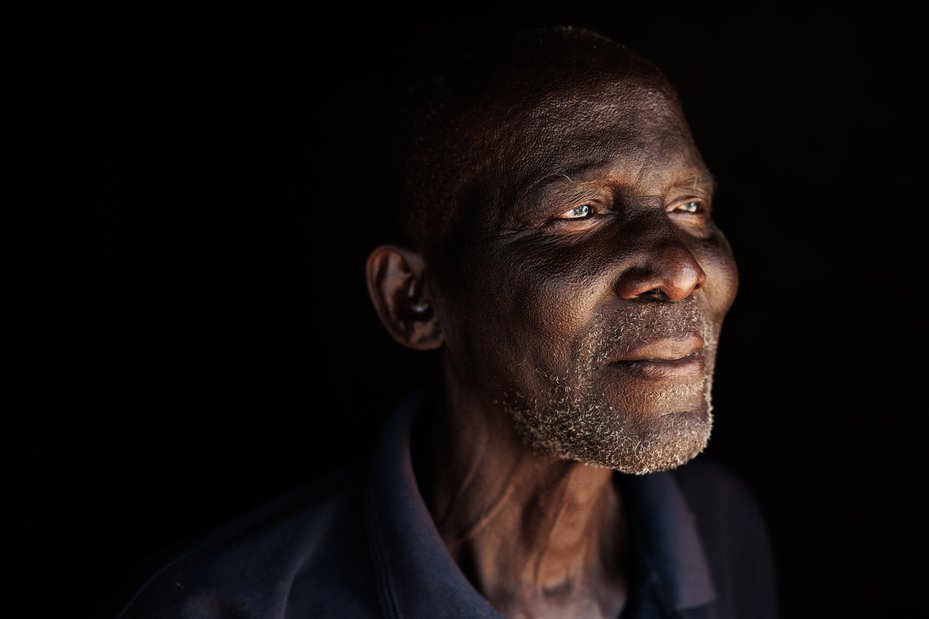
Joss Mugisa was left traumatised and ill after spending six months in jail on trumped-up charges. (Jjumba Martin / Global Witness)
He spent six months from late 2022 enduring gruelling conditions in a Buliisa jail, squashed with dozens of other men into a tin hut, sharing a small bucket to wash. He has been left traumatised and ill by the experience and wants TotalEnergies to pay for his medical care. He said the company knew about his arrest, but did nothing. In a response to Global Witness, TotalEnergies said it had investigated his arrest, but established that it was “unrelated to TEPU’s activities.”
Around the same time, the Buliisa office of two other groups, including the outspoken NGO AFIEGO, were also shut down. AFIEGO saw several staff members arrested over the course of that year, including high-profile campaigner and Global Witness partner Maxwell Atuhura. One of AFIEGO’s female staff members in Hoima described being slapped by an official who barged into their office in April 2022. She said he threatened her and took her phone.
“Civil society is living in fear… They are doing everything they can to criminalise our work.”
In 2021, the Ugandan government suspended 54 NGOs, many of them working on oil, for things like failing to file annual returns or operating without the necessary permits. A women’s rights defender whose organisation was on the list, told Global Witness that authorities now check on their activities and visit her office from time to time. “Laws have been amended to squeeze us,” she said. In the past decade, Uganda has introduced laws restricting the right to protest and NGO activities.
Benon Tusingwire, executive director at NAVODA, described harassment and phone calls by security forces interrogating him about his organisation’s registration status. An NGO based in Kampala told Global Witness they have struggled to renew their registration since earlier this year, and are now forced to operate illegally.
“Civil society is living in fear,” said one of the NGO’s staff. “They are doing everything they can to criminalise our work.”
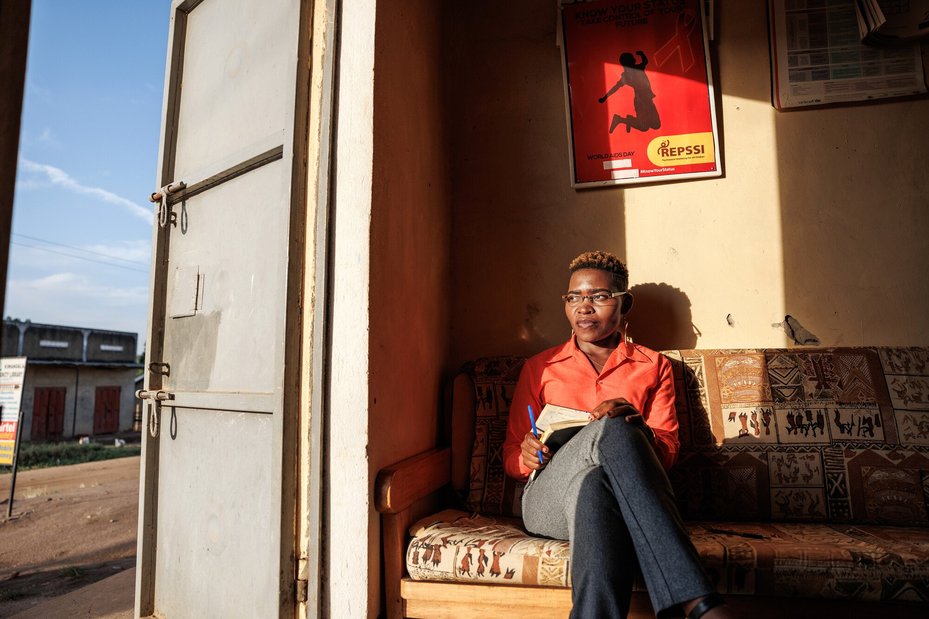
Florence Nakandi has been targeted for her work as an environmental defender
Reprisals against critics of TotalEnergies
Two community members involved in a lawsuit against TotalEnergies in France in 2019 say they have faced reprisals and are living in fear and under constant surveillance. Jealousy Mugisha described being detained and interrogated by the authorities at Entebbe Airport in December 2019, after coming back from a court hearing against Total in France. He said they told him that TotalEnergies officials had let them know he was in court.
An intelligence officer allegedly said to him, “You’ve sued the government in court, you insult our country, next time we will kill you.” Earlier this year, he said a vehicle struck his motorcycle – in what appeared to be a targeted attack – leaving him with a broken leg and scared for his life.
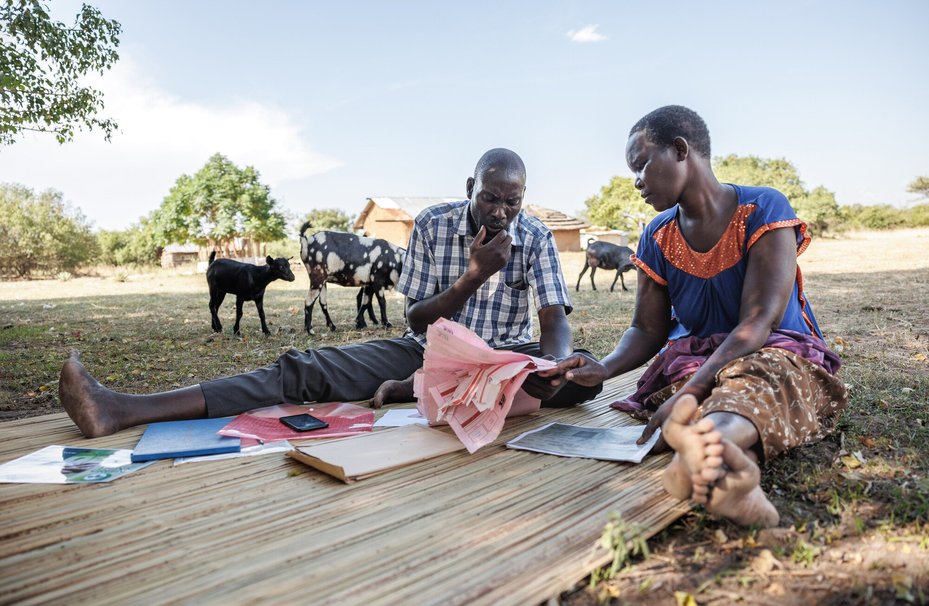
Land and environmental defenders play a vital role in protecting lands yet are often excluded from decision-making processes, such as Jealousy Mugisha from Uganda. Jjumba Martin / Global Witness
There were two attempted break-ins at Fred Mwesigwa’s house shortly after he returned from France. Previously in 2019, he was detained by police and threatened with arrest after helping an international researcher investigating the pipeline’s impacts. In 2021, he said the army stopped him on the road when he was coming back from a meeting. “They put me at gunpoint… on the ground, took my laptop,” he said. Since then, he has been living in hiding. “I don’t stay here at my home more than a week at a time.”
Several NGOs involved in the court case reported attempted or successful break-ins to their offices in recent years. In some cases, documents intended for court went missing.
According to Florence Nakandi, her organisation COTFONE often sees unknown people surveying their office. Many activists we interviewed feared they were being monitored through phone taps or spyware.
Another group involved in a lawsuit against EACOP at the East Africa Court of Justice reportedly received a phone call from the Attorney General’s Office warning them to drop the case. A few months earlier, officials interrogated them about their registration status.
“Why are you following the EACOP case? You need to be careful, you should not be a saboteur of the government,” David Kabanda, from the Centre for Food and Adequate Living Rights, recalled being told at the time.
There are grounds to investigate whether TotalEnergies and the Ugandan authorities share information about activists. As in Jealousy Mugisha's case, there are unverified reports that may suggest a reasonable connection between taking action opposing TotalEnergies and reprisals later carried out by state actors.
A community leader in one of the pipeline regions, who was first arrested in October 2021 and charged with sabotaging government projects, now lives in hiding. He has unresolved grievances with TotalEnergies. In July 2023, after three days of unsuccessful negotiations with company representatives, he said he was called to a meeting by a local government official. He didn’t go as he feared being arrested again. Shortly after, two men turned up at his house late at night looking for him, his wife told him. Luckily, he wasn’t at home as he rarely sleeps there. “I’m scared to go to sleep at home and go to sleep in the bush.”
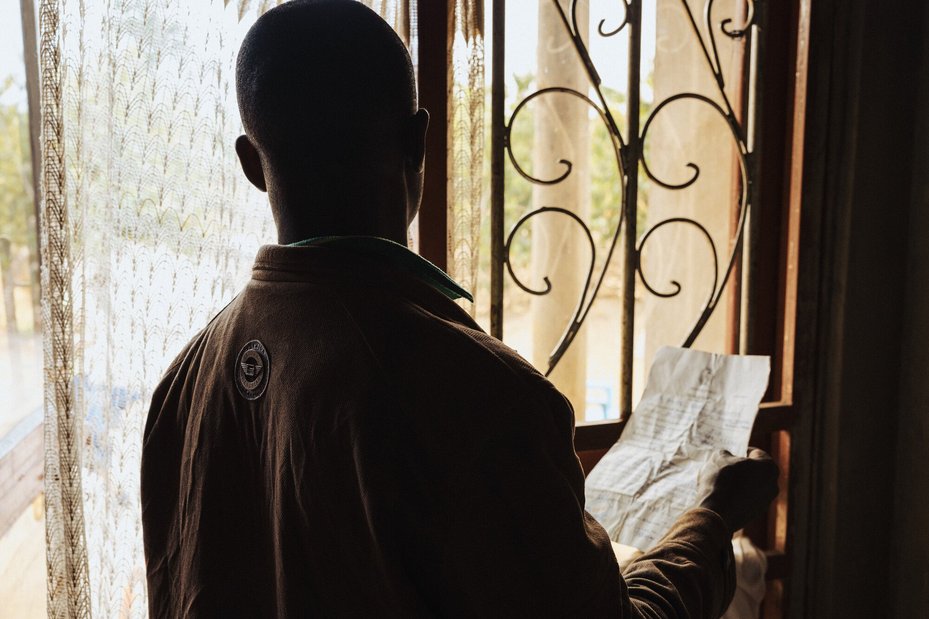
This community leader has been threatened and harassed for challenging the oil pipeline (Jjumba Martin / Global Witness)
A Buliisa-based activist recalled learning that his name was on an ‘arrest list’ from an acquaintance attending a meeting with government officials and TotalEnergies. “She called me to say I need to hide as they are coming to arrest me.”
Maxwell Atuhura believes TotalEnergies must be held to account for the role he alleges it played in his arrest in May 2021. In detention, he recalled the commander for the oil and gas police, with whom TotalEnergies coordinate closely, coming to interrogate him. “What relationship do you have with Total? Why are they asking me a lot about you?” he said he was asked. “If you don’t stop, you will suffer.” Atuhura is among several plaintiffs suing TotalEnergies in France under the country’s Duty of Vigilance law for the intimidation and harassment he’s faced opposing EACOP.
In a letter to Global Witness, TotalEnergies insisted it raised Maxwell’s case with the Ugandan authorities. It also noted his past affiliation with AFIEGO, an organisation they described as “not registered” and involved in activities that were “not authorised”. “This is a matter requiring engagement with the Ugandan authorities,” read the letter.
On the Mugisha case, TotalEnergies said it was unaware he had been detained and that he had appeared publicly at a press conference on the French court case.
Dozens of arrests
Dozens of climate activists have been arrested in the past two years for staging protests against EACOP. Some have been beaten in custody. Many have been charged with unlawful assembly under draconian anti-protest legislation weaponised against opponents of the state. The UN Special Rapporteur and the EU Parliament have condemned the harassment of human rights defenders working on oil and gas.
But in a meeting with Global Witness, the EACOP team downplayed allegations of attacks on civil society. “Every single time we hear allegations of human rights violations, we investigate…. But there is no evidence that these allegations are correct.
“The government might be arresting [activists] for ‘illegal activities’ as they might in any country… We don’t judge. It’s not for us to decide if people are arrested fairly or not.” A representative added that there was often no evidence that burglaries were committed by the state.
“Uganda is a free country. Have you had any issues coming here to report? You have not been disturbed. All countries bordering Uganda are much less free.”
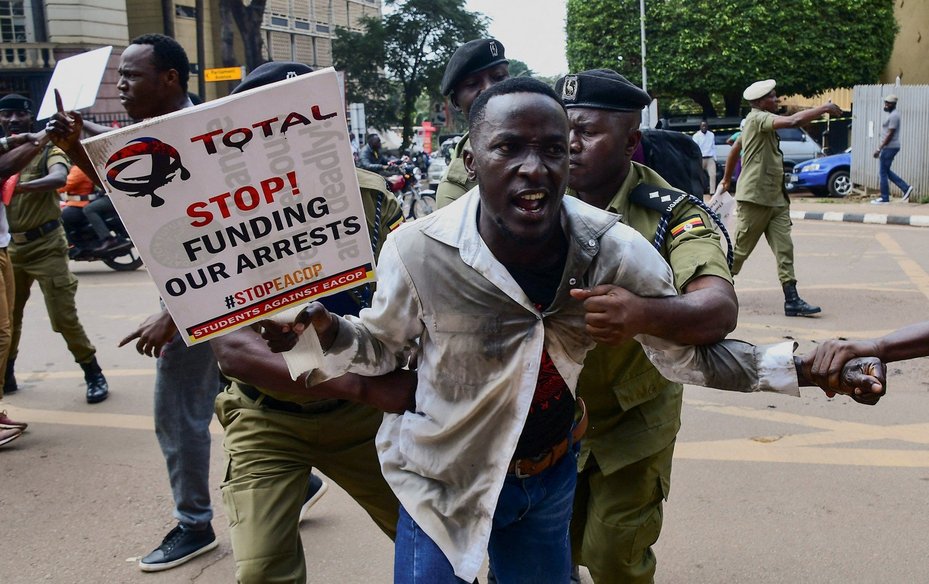
Four students were violently arrested in September 2023 for protesting against EACOP (REUTERS)
Hali ya Uoga (Download the report in Swahili)
Tanzania: stamping out civic space
EACOP was originally destined for the coast of Kenya, but TotalEnergies reportedly pushed to redirect it through Tanzania. The decision has raised eyebrows due to Tanzania’s considerably more authoritarian political environment. Under the leadership of the late president John Pombe Magufuli, Tanzania’s civic freedoms plummeted, with a ban on political rallies, and tighter restrictions on the media and free speech. His succession by President Samia Suluhu Hassan in 2021 has seen improvements, but an air of oppression remains.
In Tanzania, the president owns all land. This has made it easier for the EACOP Company to appropriate land (and it claims to have finalised 99% of compensation deals). But our investigation suggests that the oil company has benefited, intentionally or otherwise, from an authoritarian political space and a near total suppression of civil society mobilisation around the pipeline. There is an effective ban on activism perceived as ‘anti-government’ that has been used to silence land defenders and opponents of EACOP.
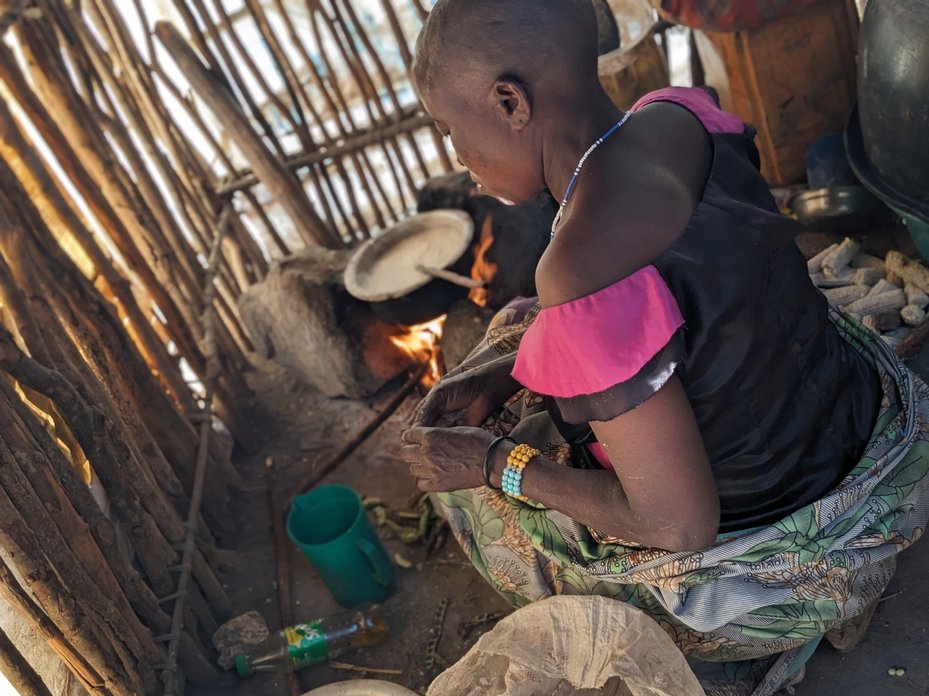
A woman in a pipeline-affected community in Tanzania (Green Conservers)
Many community members we interviewed had no access to support from civil society groups, and those who did often feared to meet them. Several had been dragged before authorities and questioned about their links to civil society groups and whether they opposed EACOP. One man from Tanga said community members need permission from the EACOP team to meet with civil society organisations. Generally pro-government civil society groups appear to be favoured.
“We are not free, we always stay hidden when meeting people from CSOs. We are not free to openly discuss any concerns because always if we do so we find ourselves in the hands of police officers,” said Aziza Bilaa, a farmer from Dodoma. She was visited by two police officers when she returned to her village from a climate change event in Kenya. She was swiftly taken to a nearby station and interrogated by police and local government officials.
“Where were you coming from? What did you do?”, she recalled being asked during her three-hour detention. “I will caution you not to do anything that’s against the project.”
The incident left her so scared she wanted to move house.
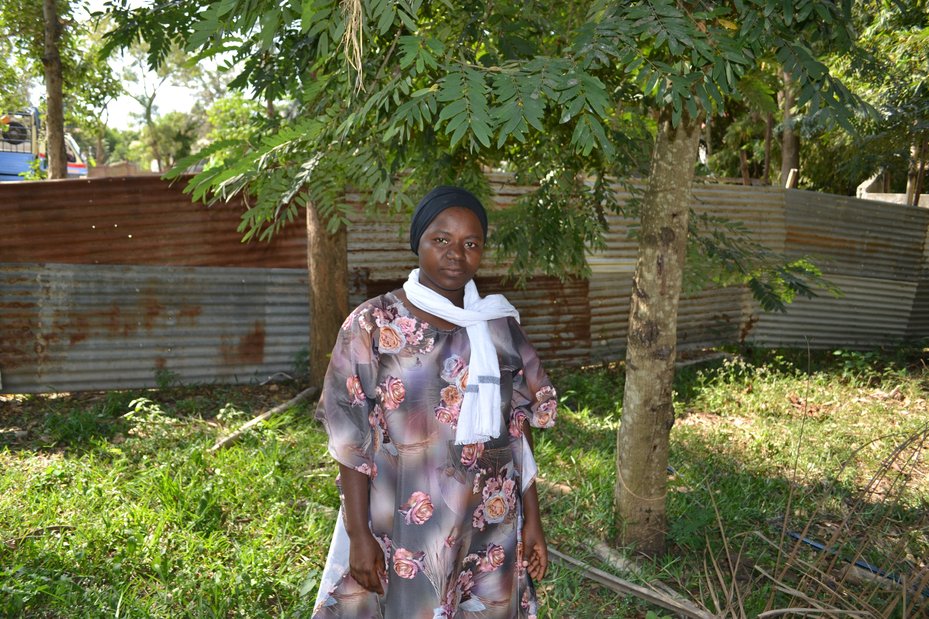
Aziza Bilaa has been threatened by authorities for meeting with civil society groups (Global Witness)
Only a handful of groups seem to work independently of the government with communities affected by the project, and they face myriad restrictions. They must keep a low profile in communities or risk being intimidated, arrested or chased away by government officials.
“Whenever you touch fossil fuels, you touch rich companies and government interests. If you touch a government issue you can be disappeared,” said an activist, who asked to remain anonymous.
The few outspoken groups and activists have been threatened, arrested and harassed by authorities.
Richard Senkondo and Baraka Lenga, both vocal environmental defenders, were forced to flee the country earlier this year after organising a press conference in Arusha that raised concerns about EACOP. None of the journalists present reportedly covered the story. But the same evening, the defenders received a message and a phone call telling them to “watch their steps” for “going against the government”. The message even mentioned the name of the hotel where they were staying. Frightened, they packed their bags and fled the country. Upon their return a few weeks later, they were met by police at their respective homes. Their houses were searched, and their computers and phones confiscated.
Senkondo has been forced to move the office of his organisation, Organization for Community Engagement, to a location further outside Dar es Salaam following repeated visits by police to harangue and intimidate his volunteers. Senkondo explained: “Police would tell the young volunteers: 'You’re still very young, you might lose your life in jail. This is a good project, we will earn money…. Why are you advocating against this project?’” All three of his volunteers resigned within days.
"If you touch a government issue you can be disappeared."
Those seen to be helping international journalists or researchers seem particularly exposed. Baraka Lenga had to report to the police in March 2022 after helping an international researcher probe the pipeline. “You need to stop being against the government,” police told him at the station. “If you want a job, we can give you one, a good job.”
Baraka Machumu, another defender whose organisation Green Conservers partnered with Global Witness on this research, has been harassed. In July 2022, he had arranged a field visit for two Italian journalists covering EACOP, before trying to secure meetings with the company to ask them questions. After being fobbed off at the EACOP office, they door-stopped the TotalEnergies office in Dar es Salaam, where a security officer detained Baraka in his office and interrogated him, demanding his phone and identity document. “We already know you showed up at our EACOP office. We know you are writing something bad about the project,” he recalled the security officer saying. “I will continue to investigate you,” he was told before being let go.
Two days later, he noticed somebody following him. A local leader let him know that some people had been asking about him and who he worked with. Later that night, he heard a knock on his door. Frightened, he didn’t answer and shortly after fled his home, and later the country. The year before, he shuttered his office after a break-in left him fearing government intrusion.
A former teacher told Global Witness he lost his position at a government school for openly criticising EACOP. Now a freelance activist, he prefers to call himself ‘an advocate’ to avoid being branded anti-government.
TotalEnergies said it “cannot be held responsible” for the actions of third-parties and strenuously denied any association with “unlawful behaviour”.
Undermining accountability
Swalehe is one of 50 potential applicants in Tanzania in a legal complaint against companies involved in the pipeline, including the UK-registered EACOP Company Limited. According to the complaint, many community members received eviction notices in 2023, after being underpaid for their land.
Shortly after submitting the legal notice, community members reported being contacted by the local authorities asking them who they were working with. Swalehe received a phone call summoning him to the office of a local government official. “Why are you protesting this project? Who is behind you?”, the official demanded. Civil society representatives involved in the court case say they were contacted by other community members who had been harassed by local officials.
Groups building a separate court case against EACOP at the East Africa Court of Justice have struggled to gain testimony from Tanzania. According to lawyers involved in the case, witnesses have been reluctant to testify, citing concerns about reprisals.
“Most people only received their compensation early this year – and are now starting to realise they were underpaid,” explained Richard Senkondo, who is receiving phone calls from people who are concerned “because now they are trying to buy land and can’t.”
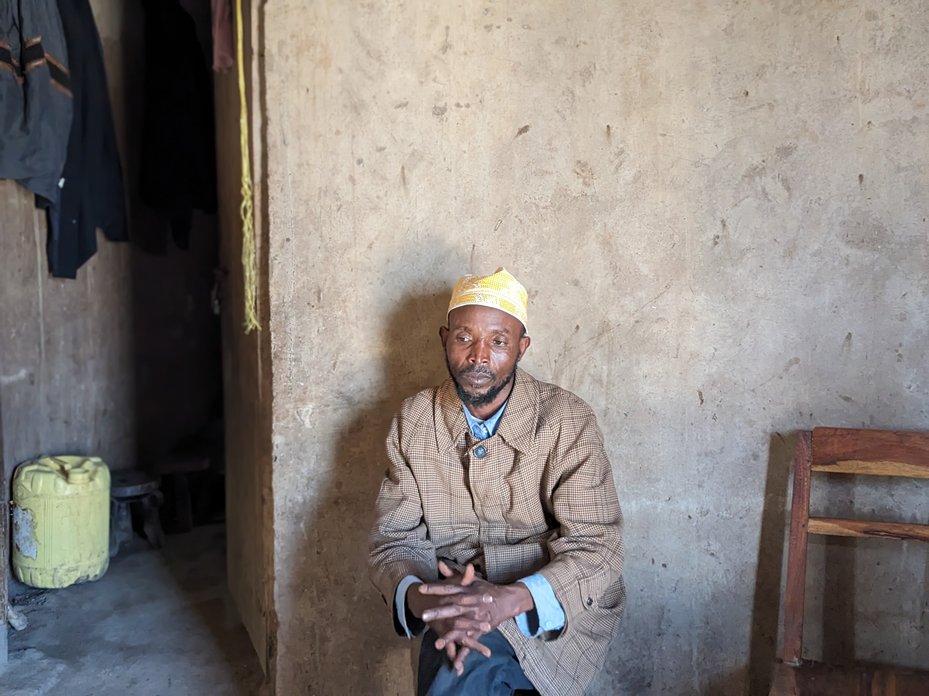
Swalehe Nkungu is one of 50 potential applicants in Tanzania in a legal complaint against companies involved in the pipeline (Green Conservers)
A chilling effect
Reprisals have had a chilling effect on frontline communities and civil society in both Uganda and Tanzania. Our research shows that communities have backed away from challenging the company over land acquisition, while some activists have softened advocacy or avoided challenging the pipeline altogether.
Two civil society groups from Uganda declined to participate in the second lawsuit against TotalEnergies in France, citing security concerns.
One female defender said she has toned down her advocacy against EACOP as a result of pressure, instead calling for better compensation and protections for women. “You cannot advocate for anything when you are dead,” she said. Another female activist described experiencing “psychological torture”, with her family living in fear. Others have gone into hiding or constantly move from place to place to avoid harassment by authorities.
"It's very costly to say ‘Stop EACOP’"
Activist groups have lost staff – sometimes to the oil company itself – and morale has drained. The risks of staging peaceful protests against EACOP have driven more activists in both Uganda and Tanzania online, which opens up new frontiers in threats and surveillance, as well as in mobilisation and advocacy.
A Tanzanian freelancer said he’s been blacklisted from working with other mainstream NGOs in Tanzania because of his EACOP advocacy. Interviews with Tanzanian mainstream climate change groups revealed an overwhelming reluctance to work on fossil fuels – let alone EACOP – to avoid offending the government. One mainstream climate group says it was instructed not to work on fossil fuels by government officials. Instead, many climate groups simply focus on promoting renewable energy, but avoid mentioning fossil fuels.
“It’s difficult to call for the oil project to be stopped,” said the Executive Director of a Ugandan NGO, who asked for anonymity on security grounds. “You’ll be harassed, intimidated, staff will lose jobs. It's very costly to say ‘Stop EACOP’.”
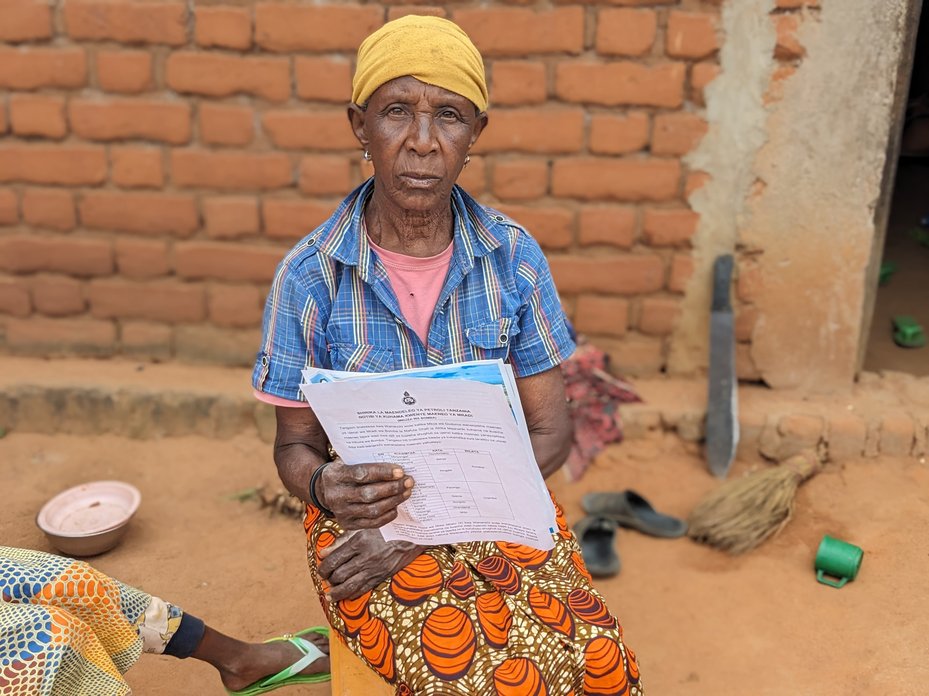
A woman holds up an eviction notice sent by the Tanzania Petroleum Development Corporation (Green Conservers)
Conclusions
The potential complicity of TotalEnergies in reprisals carried out by government agents against those challenging EACOP in Uganda and Tanzania is worthy of further investigation.
Our investigation uncovered evidence which suggests company representatives may have shared information about specific defenders with state authorities. If this has been done with the knowledge or intent that reprisals may follow (for which there is currently no evidence), this could open the company to liability. At the very least, the oil giant appears to have failed in its due diligence on the human rights impacts of doing business with two authoritarian states. The company has sought to downplay assaults on civic space, which may put them at odds with their responsibilities under the UN Guiding Principles on Business and Human Rights. Furthermore, any direct involvement in bullying and intimidation of communities into accepting compensation agreements could potentially constitute a breach of these contracts. It would also breach international standards.
Civil society in Tanzania and Uganda is split about how to move forward on EACOP. Some groups say it’s too late to stop the project and want to focus on improving benefits for local communities. Others say the project cannot be developed sustainably. Either way, the conversation has been skewed by political repression, which risks undermining the global transition to net zero.
“There should be debate on EACOP,” said Onesmus Mugyenyi, from Advocates Coalition for Development and Environment. “Not a silencing of people.”
Recommendations
Our findings show the need for global action to protect defenders and human rights in the context of climate change. The below recommendations have been developed together with environmental defenders in East Africa.
Parties to the United Nations Framework Convention on Climate Change (UNFCCC)
Recognise the role of defenders in advancing climate action and take meaningful steps to protect defenders and civic space (online and in person) to promote climate action.
Ensure meaningful and effective participation of land, environmental and human rights defenders, including Indigenous peoples and frontline communities, in the planning, design and implementation of all relevant decisions and processes related to the implementation of the Paris Agreement and in climate policymaking, including securing just energy transition and promoting human-rights-based climate action.
Ugandan and Tanzanian states
Protect the land rights and human rights of communities affected by oil developments, including by implementing the principle of free, prior and informed consent (FPIC), and ensuring that affected persons are fairly compensated for their land and property, and that they have access to independent grievance mechanisms and remedies for harms.
Allow free and full access to the oil and pipeline regions for civil society organisations, independent journalists, and researchers.
In collaboration with civil society and experts, establish and implement legal mechanisms for the protection of human rights defenders in line with the UN Declaration on Human Rights Defenders.
Lift restrictions on climate activism and the right to protest against EACOP and other fossil fuel projects.
Publicly commit to protecting land, environmental and human rights defenders as part of national energy-transition plans, and take meaningful steps to include civil society organisations and local communities in dialogue to tackle the climate crisis and promote renewable energy solutions.
Uganda:
Introduce safeguards to existing legislation that could be misused to criminalise defenders, while laws that target or criminalise protestors should be revoked.
Rescind or amend laws used to curtail free speech and civic space, including the Non-Governmental Organizations Act (2016), Public Order Management Act (2013), Computer Misuse Act (2011) and criminal defamation provisions.
Strengthen the judiciary to hear and conclude human rights and environmental cases in a timely manner.
Stop police from using police bonds to harass and intimidate environmental and human rights defenders.
Tanzania:
Introduce safeguards to existing legislation that could be misused to criminalise defenders, while laws that target or criminalise protestors should be revoked.
Rescind or amend laws used to curtail free speech and civic space ensuring greater protection for land, environmental and human rights defenders. This includes: the Cybercrimes Act (2015), the Media Service Act (2016), the Electronic and Postal Communications (Online Content) Regulations (2020), the Basic Rights and Duties Enforcement Act (1994), the Anti Money Laundering Act (2006) and the Political Parties Act (2002).
TotalEnergies
Adopt, publish and implement a policy position on land and environmental defenders, and ensure this is embedded in the company’s management systems and policies in line with the UN Guiding Principles on Business and Human Rights, including reprisal risk assessment and screening ahead of and throughout a project lifecycle.
Meaningfully implement free, prior and informed consent as stipulated in the UN Declaration on the Rights of Indigenous Peoples, ILO Convention 169 and the UN Voluntary Guidelines on the Responsible Governance of Tenure of Land, Fisheries and Forests. This should include respecting the rights of oil-affected communities to say no to EACOP and Tilenga.
Implement a ‘zero tolerance’ approach to reprisals and intimidation, and use your leverage to push the Ugandan and Tanzanian authorities to protect and respect environmental and climate defenders.
Risk-assess the policies and practices of contractors and sub-contractors in relation to land and environmental defenders on a regular basis. Support contractors to strengthen their policy positions and actions relating to land and environmental defenders where necessary.
Investigate allegations of staff and contractor complicity in human rights violations against environmental defenders and community members, and remedy harms in accordance with the UN Guiding Principles on Business and Human Rights.
Implement effective operational-level grievance mechanisms or protocols that both cover and are equipped to cope with the specific nature of grievances reported by human rights, land and environmental defenders.
Continuously engage and monitor stakeholders affected by EACOP or related oil drilling projects.
Fully cooperate with international legal bodies investigating its involvement in human rights abuses linked to EACOP and Tilenga.
Prioritise a genuine, just and rapid transition away from fossil fuels to renewable energy technologies.
Global financial institutions
Refuse to finance projects mired in human rights abuses or lacking free, prior and informed consent by affected communities, or that fail to meet international human rights standards for the financial sectors.
Scale up investments in renewable energy sectors and technologies.
Support efforts to introduce mandatory human rights and environmental due diligence requirements for companies, including under the EU’s proposed Corporate Sustainability Due Diligence Directive.
European Union
Implement a strong and ambitious directive on mandatory corporate due diligence in line with international standards and that requires companies to assess and address their harmful impacts on human rights, the environment and the climate.
Proposed due diligence legislation (the Corporate Sustainability Due Diligence Directive) should:
Require companies to conduct safe, meaningful and ongoing engagement with stakeholders that could be affected by corporate activities. This engagement must account for differentiated impacts on vulnerable groups, including women and Indigenous peoples.
Ensure that affected people and communities can take legal action against companies for the harms resulting from business activity. These measures must address the prohibitive barriers to accessing justice in European courts and ensure that those affected are afforded effective remedy, in line with international standards.
Require companies to develop and implement transition plans that align with the aims and ambition of the Paris Agreement and include their scope 1, 2 and 3 emissions.
This report was updated on 6 December 2023 to reflect an increase in the number of people arrested in Uganda between September 2020 until the date of publication from 40 to 47.
